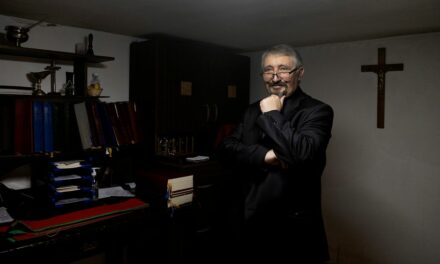Is fasting a forty-day diet? Self-torture? Not quite - everything will be revealed in the "big" fasting discussion! hirado.hu sat the rabbi, the Catholic priest, the Reformed deacon, the evangelical minister and the fitness trainer at a table to discuss the essence of fasting, how to fast well both physically and spiritually, and what should be done in order to so that the desire for a relationship with God can take on institutionalized forms. But there was talk of various fashion fasts, the limits of human tolerance, free will and even the consumption of grasshoppers. Here are some thoughts from the show:
Catholic priest Gergő Bese: It doesn't matter if it's quality food or a food supplement. Attuned to fasting, I think that Europe is looking for nutritional supplements, and unfortunately it does not realize that this will not really reduce its hunger, it always needs more and more, it is not looking in the right direction. Here, for example, is our current topic, fasting, which is a good opportunity to show this form of spirituality inherent in our churches, which is a challenge for the spirit, but a great strength for the body, if one does it with honor. So that's what you have to show people who are looking, just not in the right direction.
Lutheran pastor Máté Pongrácz: Authenticity and authentic fasting can be an interesting question, whether I, as a believer, can authentically talk about fasting, or even experience fasting, because I really feel that what we call fasting is completely different, than what the world imagines about fasting. I hit the Internet and was shocked to find that the first ten or fifteen hits in the search were completely unrelated to religious fasting. All kinds of solutions for how I could test my body a little, even make it miserable, but religious fasting is very different. At the same time, it is a test of the body, but it places the soul and spirituality next to it, and tries to harmonize these two. And this is very, very little talked about these days. I think this is our job as Christians, and perhaps on behalf of the historical churches, to highlight fasting from public thinking and tell us that fasting can be an even more exciting state, when I put my soul into this whole situation.
A person fasts if he has a non-religious reason, because he wants to test himself. He wants to test his body, where is my limit, how far can I go. Self is the motivating factor. When a religious person tries to formulate fasting, the center is never me, but the central idea of fasting is what God can accomplish with me or through me, if I renounce something.
Rabbi Jonathan Megyeri: Fasting in Judaism is a different type of fasting than in the major Christian religions. There is a biblical fast, it is on Yom Kippur. The Torah says to afflict your souls; it is a 25-hour fast with complete abstinence from food and liquids. By the way, our fasts do not mean abstaining from certain foods, but from everything. We have several fasts, the essence of which is to get rid of physical needs.
The prophet Isaiah writes that "I like that fasting", says God, when you untie the unjustly imposed chains, in Hungarian those systems of expectations that are not necessarily God's systems of expectations. So when we loosen these unjust chains, people are set free. And I think that's the attractive way, or maybe it could be one of the attractive ways.
Source and full conversation: hirado, hu
Featured image: MKPK Press Service












